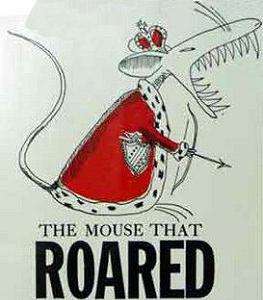The Mouse That Roared

Tully: "Well, Your Grace, we're home. Actually, there's been a slight change of plan. Ah, I know it'll come as a surprise, a pleasant one I hope, but we ... sort of won."
Sir Rupert: "You sort of what?"
Tully: "Well sir, it's a long story, but we captured the Q-Bomb, the most destructive weapon in the world. And we got some prisoners too. Ah, this is Doctor Kokintz, who invented the bomb, this is his daughter, Helen, this is General Snippet, and these are New York policemen. Oh, and, ah, this is the bomb."
Sir Rupert: "Blithering idiot!"
The Mouse That Roared is a 1955 novel by Irish-American author Leonard Wibberley, which was adapted into a 1959 film starring Peter Sellers, William Hartnell, and Jean Seberg.
Lodged between France and Switzerland lies the Duchy of Grand Fenwick, a tiny monarchy founded by an English adventurer during the Middle Ages. The local economy is entirely dependent on the one product that Fenwick exports, its trademark Pinot Grand Fenwick wine. However, when an American company throws a copycat product on the market ("Pinot Grand Enwick"), the statelet is threatened by bankruptcy.
To prevent the worst, the Fenwickians devise an ingenious plan: To declare war on the USA, get defeated, and then allow themselves to be reimbursed by American subsidies (similarly to the post-World War II Marshall Plan). Soon, a troop of twenty-four longbowmen in mail armor boards a plane to New York City with the intent to surrender to the American authorities -- only to run into unexpected obstacles.
Like the film Dr. Strangelove, the book (and later film) The Mouse That Roared was a farcical look at nuclear politics, though it ended on a far happier note than Kubrick's film. Wibberley wrote four sequels to the initial novel: Beware of the Mouse (1958), The Mouse on the Moon (1962), The Mouse on Wall Street (1969), and, finally, The Mouse that saved the West (1981). Each of them follows the same basic formula -- the Duchy of Grand Fenwick triumphs over the powerful nations of the Earth in some improbable way.
The third novel, The Mouse on the Moon was made into another film in 1963 and features Grand Fenwick winning the The Space Race.
- Alliterative Name: The "Tiny Twenty".
- Doomsday Device
- Double Vision
- Elements Do Not Work That Way
- I'm Not Hungry
- Invaded States of America: Sort of. Fenwick decides to invade the United States in order to have them rebuild their country after surrendering, but...
- Loads and Loads of Roles
- Mad Scientist's Beautiful Daughter: Helen Kokintz, except that her father is not mad.
- Micro Monarchy/Ruritania: Grand Fenwick. Exploring all the possibilities of this setting is arguably the raison d'etre of the Mouse series, making it a candidate for Trope Codifier.
- Mistaken for Aliens
- Peter Sellers
- Placebotinum Effect: Possibly subverted at the end of the movie, as the Q-Bomb's lights flicker back on after a mouse crawls out of the "dud".
- Springtime for Hitler: The original plot to lose the war. But also...
- In one of the sequel books, The Mouse on Wall Street, Fenwick has become wealthy due to part of the settlement of the aforementioned war. However, the Duchess feels that this newfound wealth is corrupting Fenwick's idyllic lifestyle, so she sets out to lose it all on the stock market by picking stocks at random (by throwing darts at the financial section of the paper). However, when other Wall Street traders notice Fenwick is investing heavily in a particular stock, the traders conclude the Duchess must have inside information and immediately invest themselves, driving the price of that stock higher and earning Fenwick even more money. In the end, she sells off all the stocks for cash, has the cash shipped back to Fenwick, and secretly burns it.
- The Mouse fill-in-the-scenario film series ran on this trope. In The Mouse On The Moon. the prime Minister of the Duchy of Grand Fenwick, desperate for indoor plumbing, tries to milk aid out of the US after their main export of wine has turned explosive by asking for cash for a space program. The US, seeing a cheap way to look like they are helping to make space international without doing something as stupid as helping another nation get an advantage over them in the space race by funding someone competent gives them a million dollars. Keen to top this, the Soviets send them an old rocket, which the PM plans to turn into a boiler for the new hot water system. The Scientist from The Mouse That Roared discovers how to make an anti-gravity mix out of the explosive wine and without telling the PM that he is really planning to go to the moon, takes off successfully
- Talking to Himself: See "Uncanny Family Resemblance".
- Uncanny Family Resemblance: The movie opening states that if some Fenwickians seem remarkably alike (while showing the Grand Duchess Gloriana, the Prime Minister Mountjoy, and Tully Bascombe, all of whom are played by Peter Sellers, along with a statue of Grand Fenwick's founder), it is because Sir Roger Fenwick "was, in every possible way, the father of his country."